Market Signals Summary:
The MAC-US model is invested. Also invested is the “VMNFX vs. SPY Timer”. The “3-mo Hi-Lo Index of the S&P500” may generate a sell signal soon. The monthly updated S&P500 Coppock indicator is also invested. The MAC-AU is also invested. The recession indicators COMP and iM-BCIg do not signal a recession. The bond market model avoids high beta (long) bonds, and a a possible downward trend is emerging in the yield curve. Both the gold and silver Coppock models are invested, and the iM-Gold Timer bought gold on 5/1/2017.
Stock-markets:
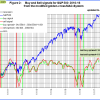 The MAC-US model generated a buy-signal 4/5/2016 and thus is invested in the stock-markets. The sell-spread (red graph) is below last week’s level and has to fall below zero to signal a sell.
The MAC-US model generated a buy-signal 4/5/2016 and thus is invested in the stock-markets. The sell-spread (red graph) is below last week’s level and has to fall below zero to signal a sell.
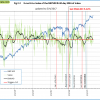 The 3-mo Hi-Lo Index of the S&P500 is above last week’s level and at 5.42% (last week 5.18%) and is in the market since 12/14/2016 when it crossed the 5% threshold. A sell signal may still be imminent after a loosing spell of the S&P 500.
The 3-mo Hi-Lo Index of the S&P500 is above last week’s level and at 5.42% (last week 5.18%) and is in the market since 12/14/2016 when it crossed the 5% threshold. A sell signal may still be imminent after a loosing spell of the S&P 500.
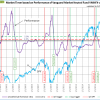 The VMNFX vs. SPY Timer signaled an entry into the stock markets on 3/28/2016. For this model to exit the markets the indicator has to rise above the 2% trigger line, the indicator is near last week’s level.
The VMNFX vs. SPY Timer signaled an entry into the stock markets on 3/28/2016. For this model to exit the markets the indicator has to rise above the 2% trigger line, the indicator is near last week’s level.
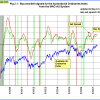 The MAC-AU model is invested in the markets after it generated a buy signal on March 21, 2016. The sell-spread is below last week’s level and has to fall below zero to signal a sell.
The MAC-AU model is invested in the markets after it generated a buy signal on March 21, 2016. The sell-spread is below last week’s level and has to fall below zero to signal a sell.
This model and its application is described in MAC-Australia: A Moving Average Crossover System for Superannuation Asset Allocations.
Recession:
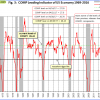 Figure 3 shows the COMP below last week’s revised level. No recession is indicated. COMP can be used for stock market exit timing as discussed in this article The Use of Recession Indicators in Stock Market Timing.
Figure 3 shows the COMP below last week’s revised level. No recession is indicated. COMP can be used for stock market exit timing as discussed in this article The Use of Recession Indicators in Stock Market Timing.
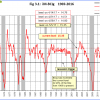 Figure 3.1 shows the recession indicator iM-BCIg which is up from last week’s level. An imminent recession is not signaled .
Figure 3.1 shows the recession indicator iM-BCIg which is up from last week’s level. An imminent recession is not signaled .
Please also refer to the BCI page
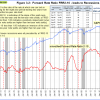 The Forward Rate Ratio between the 2-year and 10-year U.S. Treasury yields (FRR2-10) is below previous week’s level and far away from signalling a recession. A downward trend of the FRR2-10 seems to have set in again.
The Forward Rate Ratio between the 2-year and 10-year U.S. Treasury yields (FRR2-10) is below previous week’s level and far away from signalling a recession. A downward trend of the FRR2-10 seems to have set in again.
A description of this indicator can be found here.

Leave a Reply
You must be logged in to post a comment.